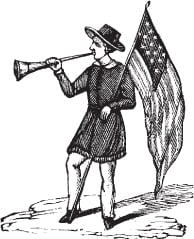
– VOICES OF FREEDOM –
From Scarouyady, Speech to Pennsylvania Provincial Council (1756)
The outbreak of the Seven Years’ War inflamed relations between Native Americans and white settlers in the Pennsylvania backcountry. Scarouyady, an Oneida leader who wished to maintain harmony, told the colony’s leaders that he approved of war against hostile tribes and hoped that a fort could be built to protect friendly Indians and keep armed whites in check. But the middle ground was rapidly disappearing.
You have . . . tried all amicable means with [the Delaware Indians] and with the Six Nations, but as all have proved ineffectual, you do right to strike them. You have had a great deal of patience; other people on losing a single man, would have armed and drove off the foe; but you have sat still while numbers of your people have been and now are murdered. . . . Your enemies have got great advantage by your inactivity; show them you are men.
You told us that you must now build a Fort at Shamokin; we are glad to hear it; it is a good thing. . . . The Fort at Shamokin is not a thing of little consequence; it is of the greatest importance to us as well as you. Your people are foolish; for want of this Fort, the Indians, who are your friends, can be of no service to you, having no place to go to where they can promise themselves protection. They cannot be called together; they can do nothing for you; they are not secure any where. At present your people cannot distinguish foes from friends; they think every Indian is against them; they blame us all without distinction, because they see nobody appear for them; the common people to a man entertain this notion, and insult us wherever we go. We bear their ill usage, though very irksome; but all this will be set right when you have built the Fort, and you will see that we in particular are sincere, and many others will come to your assistance. We desire when the fort is built, you will put into the command of so important a place some of your people; grave, solid, and sensible men, who are in repute amongst you, and in whom we can place a Confidence. . . . Do yourselves and us Justice, and bring your Enemies to a due Sense of themselves, and to offer just Terms, and then, and not till then, think of a Peace. This is our Advice.
From Pontiac, Speeches (1762 and 1763)
Pontiac was a leader of the pan-Indian resistance to English rule known as Pontiac’s Rebellion, which followed the end of the Seven Years’ War. Neolin was a Delaware religious prophet who helped to inspire the rebellion.
Englishmen, although you have conquered the French, you have not yet conquered us! We are not your slaves. These lakes, these woods, and mountains were left to us by our ancestors. They are our inheritance; and we will part with them to none. Your nation supposes that we, like the white people, cannot live without bread and pork and beef! But you ought to know that He, the Great Spirit and Master of Life, has provided food for us in these spacious lakes, and on these woody mountains.
[The Master of Life has said to Neolin:]
I am the Maker of heaven and earth, the trees, lakes, rivers, and all else. I am the Maker of all mankind; and because I love you, you must do my will. The land on which you live I have made for you and not for others. Why do you suffer the white man to dwell among you? My children, you have forgotten the customs and traditions of your forefathers. Why do you not clothe yourselves in skins, as they did, use bows and arrows and the stone-pointed lances, which they used? You have bought guns, knives, kettles and blankets from the white man until you can no longer do without them; and what is worse, you have drunk the poison firewater, which turns you into fools. Fling all these things away; live as your wise forefathers did before you. And as for these English—these dogs dressed in red, who have come to rob you of your hunting-grounds, and drive away the game—you must lift the hatchet against them. Wipe them from the face of the earth, and then you will win my favor back again, and once more be happy and prosperous.
| Questions |
|---|
| 1. What aspects of white behavior does Scarouyady object to? 2. What elements of Indian life does Neolin criticize most strongly? 3. How do Scarouyady and Pontiac differ in the ways they address white audiences? |